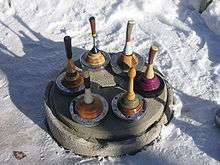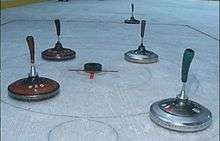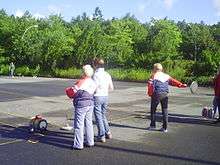Ice stock sport
Icestock sport (also known as Bavarian Curling) is a winter sport, somewhat similar to curling. In German, it is known as Eisstockschießen. Competitors slide ice stocks over an ice surface, aiming for a target, or to cover the longest distance. Icestocks have a gliding surface, to which a stick (ca 30 cm) is attached. The sport, mostly practised in southern Germany, Austria and Trentino-Alto Adige/Südtirol in Italy, has been demonstrated at the Winter Olympic Games on two occasions. Although the sport is traditionally played on an ice surface, events are also held on tarmac in summer.



History
Although the sport is probably much older, the first proof of icestock sport being practised stems from a 16th-century painting by Belgian painter Pieter Brueghel. It would take until the 1930s before the sport became organized. A German federation was established in 1934, and German championships were established two years later.
European Championships were first held in 1951, and World Championships were first held in 1983, after the International Federation Icestock Sport (IFI) had been established. Icestock World Championships has been held for men and women since 1983.
First written mentioning of icestock sport as messengers arrive to bring news of the capture of Richard Lion-heart to Leopold V, Duke of Austria, who were playing icestock on the frozen river Danube by Vienna shortly before Christmas 1192.
Source: Vatikan Library, Rom (Pope Celestine III excommunicated Leopold V) Source: University Library of Karlsruhe at a time when it still was publicly accessible
Disciplines
There are several disciplines in icestock sport, of which teams target shooting, individual target and distance shooting are contested in international championships.
In target shooting, two teams of four players each take turns in aiming for a target, the so-called Daube. Points are gained by being closest to the Daube after all four players have thrown their stock. If the Daube leaves the playing field then it is returned to the centre and play continues. The winning team is the one with the most points after six ends.
In distance shooting, the aim is simply to slide away the icestock as far as possible.
See also
- Icestock sport at the Winter Olympics
